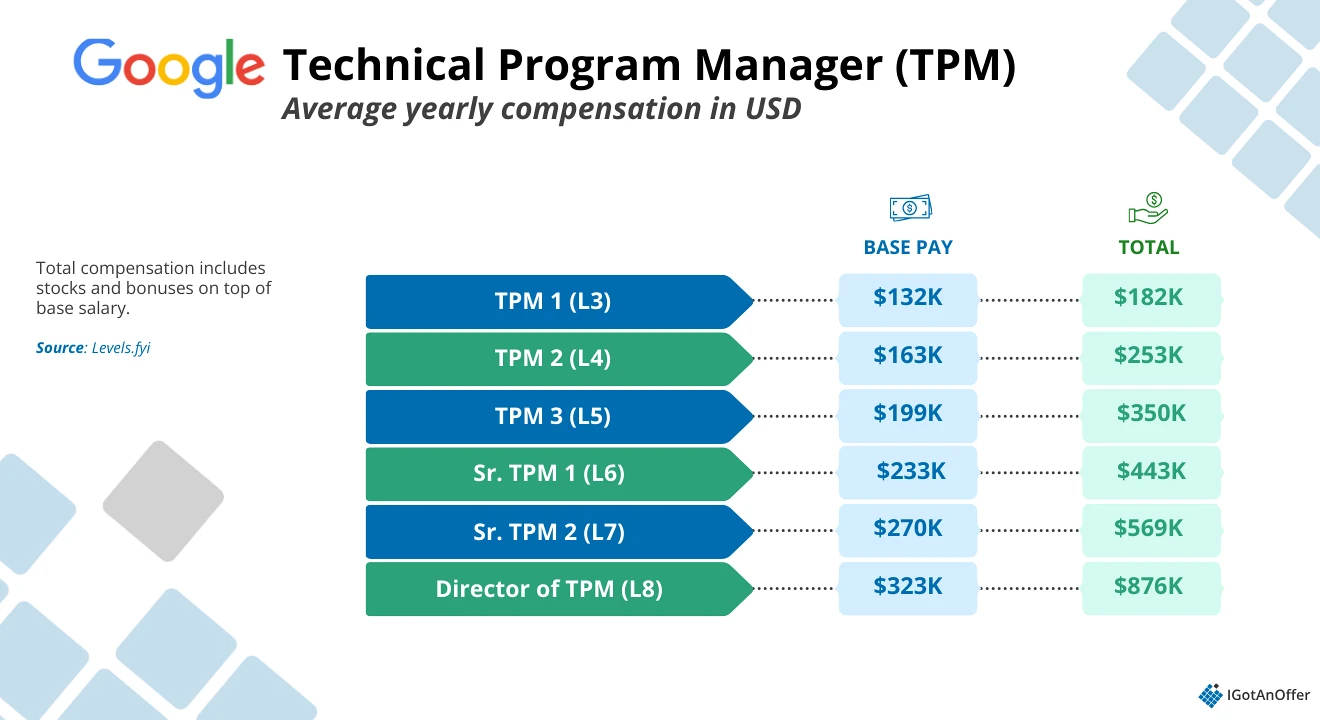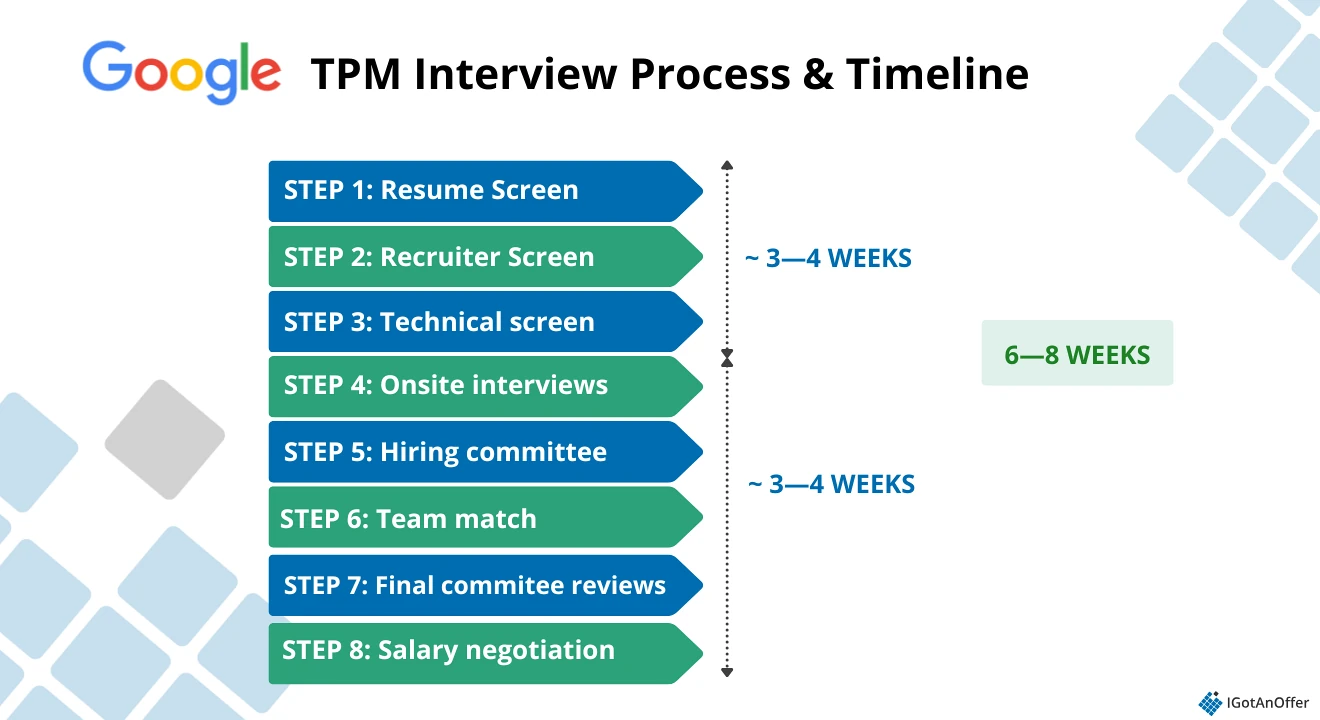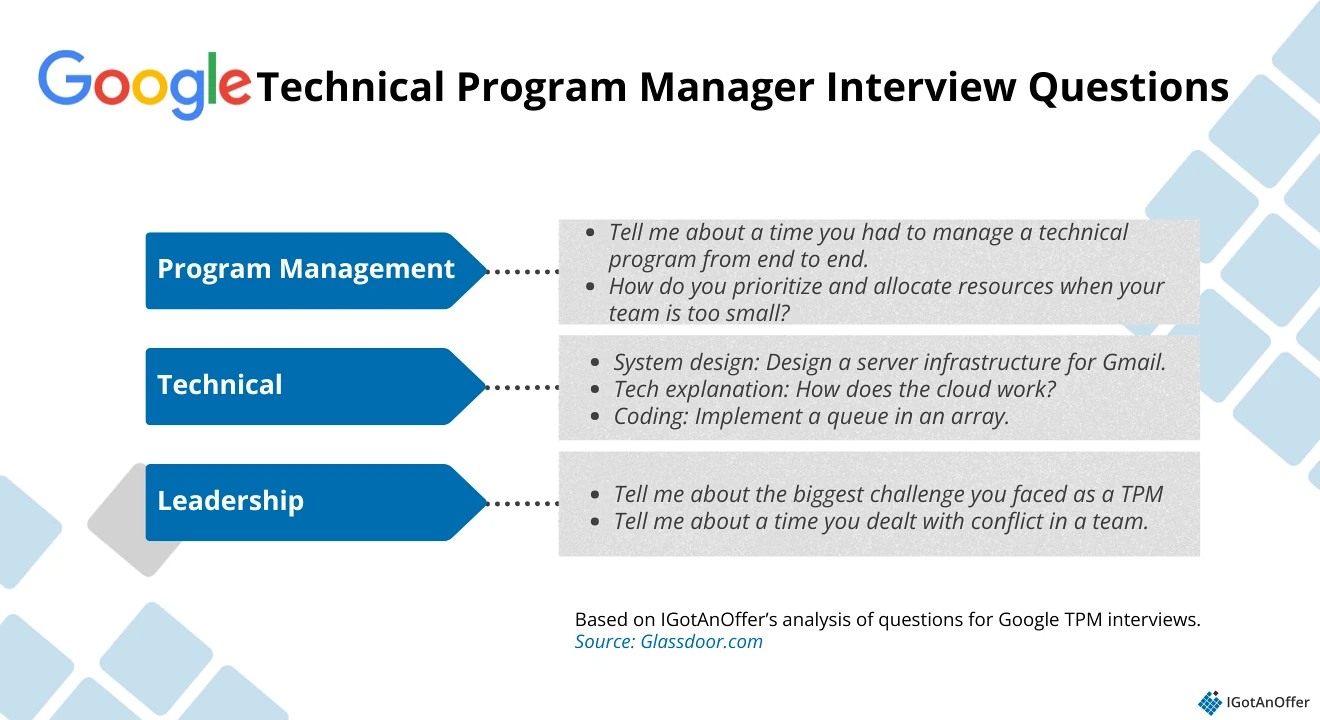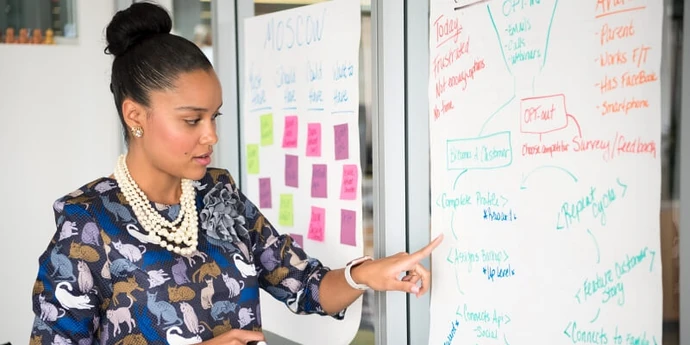Technical program manager interviews at Google are exceptionally challenging. The questions are difficult, specific to Google, and cover a wide range of topics.
The good news is that the right preparation can make a big difference in helping you land the job at Google (or Google Cloud). Below, we've put together the ultimate guide to help you maximize your chances of success.
Here's an overview of what we'll cover:
- Role and salary
- Process and timeline
- Google TPM example interview questions
- Improve your interviewing skills
- Preparation plan
Click here to practice mock interviews 1-on-1 with Google TPM ex-interviewers
1. Google technical program manager role and salary ↑
1.1 What does a Google technical program manager (TPM) do?
In a nutshell, Google TPMs focus specifically on managing complex technical projects, while traditional non-tech program managers focus more on end-user-facing features.
At Google, TPMs often work on:
- Building and scaling internal systems
- Improving technical infrastructure
- Developing cloud systems
- Rolling out machine-learning models
To make sure these large-scale technical initiatives are delivered smoothly, Google TPMs work across a variety of teams. This includes software engineering, product management, design, operations, and other stakeholders.
While Google TPMs don’t usually write code themselves, they are expected to have a strong understanding of technical concepts. This helps them manage their core responsibilities, which include:
- Determining technical specifications
- Managing engineering timelines, which may involve competing priorities
- Working across teams to develop technical roadmaps
- Proactively spotting potential risks early and resolving roadblocks
- Keeping stakeholders aligned on goals/deliverables
Basically, the Google TPM role is all about technical execution and cross-functional leadership. They make sure the right people are working on the right problems, make technical decisions in a timely manner, and keep projects on track.
While product managers decide what to build, TPMs focus on how it’s built and delivered.
Aiming for a non-tech program manager role? Learn more about Google program manager interviews here.
1.2 Salary and compensation
Google offers competitive total compensation packages for TPMs. They typically include a base salary, annual bonus, and equity in the form of restricted stock units (RSUs).
Compensation can vary depending on level, team, and location.
Below is a breakdown of the compensation typically offered to Google TPMs, based on verified user-submitted data from Levels.fyi.

TPMs in higher-cost locations, such as New York, typically earn more due to adjusted location-based compensation.
If you’re actively interviewing for a Google TPM role, ask your recruiter which level you're being considered for. This will help you understand what you should expect in terms of compensation.
And remember, compensation packages are always negotiable, even at Google. So, if you do get an offer, don’t be afraid to ask for more. If you need help negotiating your salary at Google, read our guide to Google job offer negotiations or consider booking one of our salary negotiation coaches to get expert advice.
2. Google technical program manager interview process and timeline ↑

2.1 What interviews to expect
What's the interview process and timeline at Google for a technical program manager (TPM) role? It takes more than eight weeks and follows the steps below. Note that the process at Google Cloud Platform follows similar steps.
- Resume screen
- Recruiter screen (1 interview)
- TPM technical screen (1-2 interviews)
- TPM onsite interviews (typically 5 interviews)
Let's look at each of these steps in more detail below:
2.1.1 Resume screen
First, recruiters will look at your resume and assess if your experience matches the open position. This is the most competitive step in the process, as millions of candidates do not make it past this stage.
You can use this free TPM resume guide and browse some Google resume examples to help tailor your resume to the Google TPM role you’re targeting.
And if you’re looking for expert feedback, you can also get input from our team of ex-Google recruiters, who will cover what achievements to focus on (or ignore), how to fine-tune your bullet points, and more.
2.1.2 Recruiter screen
In most cases, you'll start your interview process with Google by talking to a recruiter on the phone. They are looking to confirm that you've got a chance of getting the job at all, so be prepared to explain your background and why you’re a good fit at Google.
You should expect typical behavioral and resume questions like, "Tell me about yourself", "Why Google?" or "Tell me about your current day-to-day as a Technical Program Manager."
If you get past this first HR screen, the recruiter will then help schedule your first TPM screen. Your recruiter will usually let you know who you are interviewing with, what type of interviews you should expect, and share resources to prepare for them.
2.1.3 TPM technical screen
You'll go through one or two initial 45-minute screens, which usually happen over a virtual call with a current Google TPM.
The types of questions you'll be asked are the same as during the onsite. Be prepared to cover: program management, technical, and leadership questions. More on that below.
The role of the phone screen is to make sure it's worth bringing you onsite. Your interviewer will therefore try to make sure there isn't an area where you are particularly weak and don't stand a chance of meeting the hiring bar.
2.1.4 TPM onsite interviews
Onsite interviews are the real test. You'll typically spend a full day interviewing with Google TPMs and software engineers. Each interview will last about 45 minutes and cover one of the following topics:
- Program management interview, where you'll be asked to demonstrate your program management and execution acumen.
- Technical interview, where you'll come across a mix of system design, technical explanation, and sometimes simple coding questions.
- Leadership interview, where you'll be tested on your ability to lead cross-functional teams toward a common goal.
In most cases you'll have three program management, one technical, and one leadership interview. But for particularly technical positions, you might get two program management and two technical interviews.
Generally, Google only gives system design interviews to candidates who are considered to be Level 5 and above. For more information, take a look at our complete guide to the Google system design interview.
Your onsite interviews will likely be held virtually, which has been the case since the COVID-19 pandemic.
However, if you live near a Google HQ, you may be invited for in-person interviews. If you are invited, you may also be given the chance to have lunch or coffee with a fellow TPM. This is meant to be your time to ask questions about what it's like to work at Google. (The company won't be evaluating you during this time, but we recommend that you behave as if they were.)
In some cases, Google may ask you to do a follow-up interview after your onsite to drill you further on one of the three areas we listed above. This means you're close to getting an offer, but the company wants to double-check that you're meeting the hiring bar for a given criteria (e.g., leadership).
Your recruiter should be able to provide you with the most up-to-date information on Google’s onsite interview procedures. Feel free to ask them for details after you've been officially invited to participate in the onsite interviews.
2.2 What exactly is Google looking for?
At the end of each interview, your interviewer will grade your performance using a standardized feedback form that summarizes the attributes Google looks for in a candidate. That form is constantly evolving, but we have listed the main components we know of at the time of writing this article below.
A) Questions asked
In the first section of the form, the interviewer fills in the questions they asked you. These questions are then shared with your future interviewers so you don't get asked the same questions twice.
B) Attribute scoring
Each interviewer will assess you on the four main attributes Google looks for when hiring:
- General cognitive ability. This is often referred to as "GCA" by Googlers. The company wants to hire smart TPMs who can learn and adapt to new situations. Here, your interviewer will try to understand how you solve hard problems and how you learn. For more information, take a look at our guide to the GCA interview.
- Role-related knowledge and experience. This is often referred to as "RRK" or "RRKE" internally. The company wants to make sure that you have the right experience, domain expertise, and competencies for the position you're applying for. For more information, take a look at our guide to the RRK interview.
- Leadership. Google looks for a particular type of leadership called “emergent leadership.” You'll typically be working in cross-functional teams at Google, and different team members are expected to step up and lead at different times in the lifecycle of a project when their skills are needed. More information in this guide to Google leadership questions.
- Googleyness (i.e., culture fit). The company wants to make sure Google is the right environment for you. Your interviewer will check whether you naturally exhibit the company's values, including: being comfortable with ambiguity, having a bias to action, and having a collaborative nature. More information is in this guide to Googleyness.
Depending on the exact job you're applying for, these attributes might be broken down further. For instance, "Role-related knowledge and experience" might be broken down into "Program management" and "Technical judgment" for a TPM.
In this middle section, Google's interviewers typically repeat the questions they asked you, document your answers in detail, and give you a score for each attribute (e.g., "poor", "mixed", "good", "excellent").
C) Final recommendation
Finally, interviewers will write a summary of your performance and provide an overall recommendation on whether they think Google should be hiring you or not (e.g. "Strong no hire", "No hire", "Leaning no hire", "Leaning hire", "Hire", "Strong hire").
2.3 What happens behind the scenes
If things go well at your onsite interviews, here is what the final steps of the process look like:
- Interviewers submit feedback
- Hiring committee recommendation
- Team matching
- Senior leader and compensation committee review
- Final executive review (only senior roles)
- You get an offer
After your onsite, your interviewers will all submit their feedback usually within two to three days. This feedback will then be reviewed by a hiring committee, along with your resume, internal referrals, and any past work you have submitted. At this stage, the hiring committee will make a recommendation on whether Google should hire you or not.
If the hiring committee recommends that you get hired, you'll usually start your team-matching process. In other words, you'll talk to hiring managers, and one or several of them will need to be willing to take you into their team for you to get an offer from the company.
In parallel, the hiring committee recommendation will be reviewed and validated by a Senior manager and a compensation committee who will decide how much money you are offered. Finally, if you are interviewing for a senior role, a Senior Google executive will review a summary of your candidacy and compensation before the offer is sent to you.
As you've probably gathered by now, Google goes to great lengths to avoid hiring the wrong candidates. This hiring process with multiple levels of validations helps them scale their teams while maintaining a high caliber of employees. But it also means that the typical process can spread over multiple months.
3. Google TPM example interview questions ↑
We believe in data-driven interview preparation and have used Glassdoor data to identify the types of questions that are most frequently asked at Google.
Let's dive in and look at the three types of interviews you can expect at Google:
- Program management interview
- Technical interview
- Leadership interview

3.1 Program management interview
Google TPMs design and execute programs from end-to-end. It's therefore important that they have a strong ability to plan, prioritize and deliver projects.
This is the part of the interview process where you need to show you think about programs comprehensively (e.g., resources, risks, vendors, etc.) and have a track record of executing flawlessly.
“Know the project lifecycle like the back of your hand. The PMBOK is a great place to start.” Nupur (former Google TPM)
We've listed typical questions you can expect in this interview below and grouped them into four subcategories to help you organize your preparation. All the questions listed are from TPM interview reports available on Glassdoor.
Notice that almost all questions on the list can be asked as hypothetical questions (e.g., "How do you manage programs from end-to-end?"), or behavioral questions (e.g., "Tell me about a time you managed a program from end-to-end").
Although the two phrasings are similar, they require different answers. For hypothetical questions, you should explain your hypothetical approach to the question asked (e.g., “I would do XYZ to manage a program”). For behavioral questions, you need to take a real example from your past and explain what you did (e.g., “I did ABC to manage my program last year”).
This might sound obvious, but it's a common mistake candidates make in interviews that's easy to avoid.
Here are some example interview questions you may encounter:
Example program management questions asked in Google TPM interviews
1. General / end-to-end questions
- Tell me about a time you had to manage a technical program from end to end.
- How would you manage hypothetical project X (e.g., replace discs in a data center)?
- What methodology do you use in your projects and programs?
- What makes a successful program manager?
- Tell me out loud how you would create something new from scratch, end-to-end.
How would you structure and roll out a new service to a market?
2. Prioritization
- How do you prioritize your work?
- How do you make decisions?
- How do you deliver programs on a tight timeline and with limited resources?
- How do you prioritize and allocate resources when your team is too small?
- If you were given several tasks with varying due dates and limited information, how would you schedule them?
- If your co-worker or another manager is on long leave and you need to take over their team, how would you prioritize your work?
3. Delivery
- What is a critical path in project management?
- How do you make sure you deliver quality outcomes in your projects?
- Describe and whiteboard a continuous deployment system. And a continuous build system.
- Compare the agile and waterfall methodologies.
- Imagine you find a critical bug in software the day before the release date. How do you handle the situation?
- If the distribution center collapsed, what would you do to match demand and supply?
- What would you do if the customer says the capacity is full?
4. Kickoff / Sunset
- What's your process to kick off programs?
- What's your process to sunset programs?
- You're joining a project with no timeline and which didn't have a kickoff. What do you do?
- Walk me through the complete program lifecycle.
5. Planning
- How do you handle additional requirements in the middle of a project?
- How do you build a forecasting tool / document?
- How do you forecast a project with no history?
- How would you assess a new Google site?
- What are the top 3 elements of a supply chain?
6. Risk
- How do you manage risks on projects?
- Tell me about a time you had to manage a significant risk on one of your programs.
- What are the trade-offs of agile development?
7. Vendors
- How do you choose when to build in-house vs. using a third-party solution?
- What's your process for working with vendors on your projects / programs?
- How would you choose between an off-the-shelf or in-house development of a product? How would you present it to management in 4 slides?
For more guidance, check out this program management primer for tech interviews.
3.2 Technical interview
3.2.1 System design questions
Google TPMs tend to work on very technical programs. They need to be able to engage in system design discussions with engineers and discuss the merits of architecture A vs. architecture B.
Google's products have millions of monthly active users. Therefore, their systems need to be highly scalable. As a consequence, you should expect part of the design discussion to focus on performance, efficiency, and scalability.
This is the part of the interview process where you need to show that you have thorough technical knowledge and can discuss architecture concepts in a clear and structured way.
System design questions are usually either about diving deep into the design of a system you've previously worked on (e.g. Tell me about the design of the most complex project you've worked on), or about designing a new system from scratch (e.g. How would you design Netflix?).
Here are some more examples:
Example system design questions asked in Google TPM interviews
- Design a server infrastructure for Gmail.
- Design a global system to upgrade software on a fleet of machines.
- Design a web cache.
- Design a file transfer system that can move 100 Petabytes of data from the US East Coast to the US West Coast.
- How would you deploy a solution for cloud computing to build in redundancy for the compute cluster?
- Design Facebook (read heavy).
- Design GDrive (write heavy).
- Design WhatsApp.
- How many times will you have design reviews during project development?
- Design Google Maps.
- How can you make a picture of every street on Earth?
Click here for more in-depth guidance on Google system design interviews.
3.2.2 Technical explanation questions
Technical explanation questions aim to test the depth of your technical knowledge and your ability to communicate that knowledge in a simple way. A typical example would be: "What happens when you enter a URL in your browser?"
Your interviewer will usually ask you technical questions based on the projects and technologies listed on your resume. You should therefore brush up on the technologies you've used in the past.
In other words, a TPM with a software development background will be asked different technical questions than a TPM with a background in machine learning, embedded systems, or hardware engineering.
Example technical explanation questions asked in Google TPM interviews
- What happens when you enter a URL in your browser?
- How does the cloud work?
- What is Ethernet?
- What is the difference between TCP and UDP?
- Describe the TCP protocol.
- What are threads? What is multi-threading?
- What actually happens when a file is deleted on a machine?
- Describe the memory structure of an operating system (heap, data, and stack).
- Explain the XYZ technology listed on your resume.
- Explain hashing algorithms for encryption.
- Do you know IRU (Indefeasible Rights of Use)? Please describe briefly.
- How to find and improve data throughput rate when there's a problem.
3.2.3 Coding questions
Coding questions aren't systematically asked, but are still regularly mentioned in interview reports. If you're currently an engineer, then you'll probably be asked to write working code. If you are currently in a role other than engineering, then pseudo-code will most likely be fine.
Also, notice that the questions asked are much easier than the Leetcode questions you can expect in Google software engineer interviews.
Here are some examples:
Example coding questions asked at Google TPM interviews
- Write a program to find if an integer is a palindrome. (Solution)
- Write a program to select two numbers whose sum is lower than a target number. (Solution)
- Write a program to reverse a string (no built-in functions can be used). (Solution)
- Implement a queue in an array.
- Parse all lines in a CSV file with a given string. (Solution)
Finally, we recommend reading our guide on Google coding interviews and practicing with this list of coding interview examples with answers, in addition to reviewing those listed above.
3.3 Leadership interview
Google TPMs usually work in cross-functional teams with other engineers, QA, product managers, PMMs, data analysts, etc. They need to be able to communicate clearly, work with others efficiently, build trust and relationships, etc.
In addition, TPMs usually don't have direct authority over most of the resources they work with. They therefore need to be able to lead teams by influencing and motivating others, resolving conflicts when they arise, driving alignment, etc.
“It's helpful to be someone who is kind, technical and organized, so that the team can lean on you to figure their schedule out. The most respected TPMs were humble and good listeners and had great documentation skills,” says Nupur (former Google TPM).
This is the part of the interview process where you really want to show that you are good at working with others and driving successful cross-functional collaboration.
Nupur says, “Think cross-functional. Who would you inform or consult? Mention those people—product managers, engineering managers, other TPMs. This demonstrates your ability to collaborate with others to advance work.”
Be prepared to talk about situations where you've troubleshooted program bottlenecks, negotiated design components with engineers, adapted your program when requirements changed, etc.
We've listed common examples that you can expect in this interview, according to data from Glassdoor. Again, here, you should be ready to answer both hypothetical questions (e.g., "How would you do XYZ?"), and behavioral questions (e.g., "Tell me about a time you did XYZ"). Finally, we've also included generic behavioral questions (e.g., “Tell me about yourself”) that you might get asked in any Google interview for comprehensiveness.
Example leadership questions asked at Google TPM interviews
- Tell me about yourself.
- Why Google?
- Tell me about a time you worked with a difficult engineer / executive / stakeholder / client.
- Tell me about a time you failed.
- Tell me about the biggest challenge you faced as a TPM / in your current role.
- Tell me about a time you faced a technical and people challenge at the same time.
- Tell me about a time you had to work with a "superstar" and how you dealt with them.
- Tell me about a time your team didn't agree on the path forward.
- How do you manage someone who doesn't deliver what they promised or who underperforms?
- How do you deal with difficult stakeholders?
- What makes a good leader?
- Have you ever had a disagreement with a colleague? What happened and how was it resolved?
- Tell me about a time when you worked cross-functionally.
- How do you handle ambiguity?
- Describe some attributes of a high-functioning team.
- Tell me about a time when you had to overcome the doubts of your boss or management.
- Do you think what character TPMs should own?
- Imagine you work on a team with an individual or in a negative culture. How would you address the issues?
- Tell me a situation where you convinced someone to change an opinion.
- How would you handle a situation in which you had to help lead a team through a difficult transition?
For more guidance, check out our guide to Googleyness/leadership interview questions and our people management primer for tech interviews.
4. Improve your interviewing skills ↑
Plenty of candidates are excellent at their jobs, but still end up failing their Google TPM interview. Why? Their interview skills are simply not up to par, especially for a company as competitive and prestigious as Google.
Here are some tips to keep in mind when preparing for your Google interview:
4.1 Don’t jump straight to answering
Answering a question right away may seem like a great way to show your confidence and knowledge, but it can be a huge red flag to interviewers. It shows them that you: 1) haven’t taken the time to pause and truly think about your answer, 2) haven’t bothered to ask clarifying questions or discuss possible approaches, and 3) are not being collaborative with your interviewer.
All three are bad signs for how you may work within teams, especially for a cross-functional role. For Google interviewers, your collaboration and communication skills are just as important as your technical capabilities.
Instead, take a moment to think before you respond. It’s okay to pause or jot down notes, as long as you let the interviewer know that’s what you’re doing.
Example:
- Question: “Can you tell me about a time you had to disappoint your supervisor?”
- Response: “That’s a great question - give me just a minute to collect my thoughts.”
This helps by:
- Giving you time to consider and structure your response
- Signaling that you are thoughtful in your communications, even in an interview setting
As for a technical interview, you’ll want to start by discussing your approach before you start coding or drawing up solutions. Writing pseudocode, for example, is an excellent way to outline your plan and show your thought process to the interviewer.
This tip is most relevant for technical interviews like coding and system design, but you can also apply it to behavioral interviews. For example, if you’re asked about previous work experiences and have several scenarios to share, you might want to ask your interviewer which story they prefer to hear.
4.2 Answer with intention
Many of the questions you’re asked in a TPM interview will be open-ended. That means there are no right or wrong answers. You have to choose what area to focus on within the large possible space of responses.
In addition to this, you’ll also want to be intentional by tailoring your answers to the specific domain you’re applying for as a TPM, if applicable.
According to Nupur (former Google TPM), “A TPM in infrastructure will be different from a TPM in product. Infrastructure TPMs may have more analytical work, while product TPMs will have more scheduling and planning.”
One way to make sure you’re going in the right direction is to first refine the scope of the question.
Consider the larger topic, then either ask for clarification from the interviewer or propose some context/constraints within which you will respond. Here’s an example of how to do this:
Example:
- Question: “What’s your approach to leading a team?” (The interviewer could be asking about your principles and values, or they may just want to know your best practices for implementing them.)
- Response (clarification): “Leading a team is a pretty broad topic. Can you elaborate a bit on what you’re after?”
- Response (assumption): “This question makes me think about principles. Let me talk about three that are important to me and how I apply them.”
This helps by:
- Forcing you to focus your response, both in terms of time and content
- Signaling that you recognize the complexity of the situation being asked about
4.3 Be honest with your knowledge gaps
Your interviewer does not expect you to know everything. If you’re unsure about how to proceed with a question, be honest about that. Your interviewer will be able to tell anyway!
Transparency is important, and you can still offer up a possible solution at the same time. For example, you may say something like: "I don't know that much about X, but I think I would do Y here, correct me if I'm wrong.”
“Don’t panic if you don’t have all the information — show how you make rational, defensible decisions anyway,” Halim (ex-Meta senior product manager) says.
The same goes for your behavioral questions. If you've faced challenges or setbacks, be honest and own up to your mistakes and failures. But most importantly, discuss how you improved and learned from them.
4.4 Break problems into smaller tasks
The types of coding questions that are asked in tech interviews can typically be broken down into 2-5 tasks, which will each take a few minutes to complete. While you’re making your plan, list out these small steps and explain them to your interviewer.
Then, as you work through those steps, cross out each one you complete and let your interviewer know, e.g., “I have completed task X, and now I will work on Y, then Z.” Doing this will also boost your confidence each time you finish a smaller task.
By breaking problems down into smaller tasks, you’re showing your ability to tackle difficult, long-term projects on the job.
4.5 Acknowledge trade-offs
Any decision you make when problem-solving will have a trade-off. So, call them out in real-time. Use it as an opportunity to discuss different approaches with your interviewer and explain why your choice is the best one.
If you don’t bring up trade-offs, your interviewer will almost certainly ask about them. It’s better to beat them to it and show that you’re able to think strategically.
4.6 Adapt to follow-up questions
Interviewers will often ask follow-up questions, whether it’s a coding, system design, or behavioral interview. So, don’t be alarmed when your interviewer probes your answers!
Instead, listen carefully to the way your interviewer asks these questions. There will often be subtle clues about what they’re looking to assess in your next answer.
Sometimes, follow-up questions are also a way for your interviewer to steer you in a particular direction. So, don’t hesitate to follow them! In fact, most interviewers have good intentions and are trying to help you, so listen actively for hints.
4.7 Answer in a clear and structured manner
Practicing with an answer framework helps you achieve clearer, structured answers, whether it’s for coding, system design, behavioral, or other types of interviews.
For behavioral interviews, in particular, you’ll want to make sure your answer only includes necessary information. Practice setting up your answer in 30 seconds or less, and cut down unnecessary or vague details.
4.8 Quantify your achievements
“Use metrics and data to demonstrate the impact of your contributions,” Bilwasiva (Amazon applied scientist) says.
Numbers and data help paint a clearer, more tangible picture of your skills and experience. Plus, they show your potential to make significant contributions to a team, especially for an important technical role like TPM.
4.8 Prepare for 3 types of leadership questions
Interviewers for managerial roles generally ask three types of leadership questions.
- Stories: “Give me an example …” / “Tell me about a time when …”
- Skillsets: “How do you …” / “What’s your approach to …”
- Scenarios: “Assume you have …” / “How would you deal with …”
You should understand and respect the way they’ve phrased the question and try to answer in a way that matches their expectations.
So, if they ask you to “tell me about a time…” give them a story rather than a hypothetical scenario, and so forth.
But if you feel strongly that you need to diverge, get the go signal from the interviewer first. Take a look at this example.
Response 1 is a standard skillset response, while Response 2 is for when you think you may have a stronger story to offer.
Example:
- Question: “How do you work through conflict on your team?”
- Response 1: “I’m going to assume that we’re talking about constructive conflict based on a respectful relationship between team members. I have three things that I try to consider as I work through conflict.”
- Response 2: “I think of conflict as a necessary path to coming up with solutions. It needs to come from a point of respect, of course. I have a good recent example that I can share. Is that okay?”
This helps by:
- Providing additional structure to scope your response
- Minimizing cognitive dissonance (wasted energy) by aligning your and the interviewer’s mental models
- Allowing the interviewer to choose whether or not to switch gears
4.9 Prepare to talk about people management
Not surprisingly, interviewers will want to assess your people management skills to find out how well you can lead a team. You can expect questions about how you get the best out of people and how you deal with conflicts that may arise.
4.10 Prepare to talk about project/program management
Often, a successful TPM at Google is expected to manage more than one program at a given time. For example, you have to oversee 1 large program along with several smaller programs. Your interviewer will want to see that you can effectively lead projects end-to-end.
“It's not enough to navigate ambiguity. Google TPMs have to actually drive clarity and alignment,” Ines, former Google TPM says.
As a Google TPM, you’ll need to ensure that what you’re working on aligns with the organization as a whole, while making sure that customers are still benefiting.
You’ll have to show your interviewer that you possess the right skills and knowledge for this. This includes:
- Influencing without authority
- Ability to navigate ambiguity
- Proactive problem-solving
- Excellent written and verbal communication
- Solid understanding of how the organization works, its goals, and how it intends to achieve them
Overall, prepare to answer questions about project/program management methodologies, your ability to deal with complex situations, and your experience delivering results.
4.11 Demonstrate both confidence and a growth mindset
Google seeks candidates who are confident in their skills, but who still actively seek growth. Interviewers will usually assess this in the behavioral questions they ask.
Mark (ex-Google engineering manager) says that when preparing your stories, ask yourself: "Do the stories and experiences that I’m giving show that I’m always looking to grow and learn, rather than having a fixed mindset?"
So, how exactly can you demonstrate this? By asking questions, applying feedback, and owning up to the gaps in your knowledge, while still pushing through. This shows a growth mindset by demonstrating your ability to adapt and learn fast.
However, be careful about asking too many questions and needing confirmation for every decision you make! This can show a lack of confidence in your skills, not a growth mindset. Only ask for confirmation at certain points when talking through your solution.
5. Preparation plan ↑
Now that you know what questions to expect, let's focus on how to prepare. After all, the right preparation will make the difference between failing your Google interviews and getting an offer.
Here are the four most important things you can do to prepare for Google (or GCP) Technical Program Manager interviews.
5.1 Learn about Google's culture
Most candidates fail to do this. But before investing tens of hours preparing for an interview at Google, you should take some time to make sure it's actually the right company for you.
Google is prestigious. It's tempting to assume that you should apply, without considering things more carefully. But, it's important to remember that the prestige of a job (by itself) won't make you happy in your day-to-day work. It's the type of work and the people you work with that will.
If you know TPMs who currently work or used to work at Google, it's a good idea to talk to them to understand what the culture is like from the inside. In addition, we recommend reading the following resources:
- Google's mission statement (by Google)
- Google's values (by Google)
- Google strategy teardown (by CBS Insights)
- Article: “I'm a Google technical program manager. This is how AI has transformed my job.” (by Ana Altchek for Business Insider)
5.2 Practice by yourself
As mentioned above, you'll have three types of interviews at Google: program management, technical, and leadership.
5.2.1 Program management interview preparation
For program management interviews, we recommend starting with our program management primer. Also, take a look at the following video, which outlines how Google thinks about program management.
Here is a summary of the video:
- Communication and influence. Make sure you communicate in a structured way and use data to anchor your arguments whenever possible.
- Navigating ambiguity. Show you use program requirement documents and roadmaps to align stakeholders and move forward despite ambiguity.
- Stakeholder management. Show you are proactive about managing stakeholders by constantly making sure everyone is aligned and trying to anticipate issues before they arise.
- Technical partnership. Make it clear you're comfortable diving into technical details when your team needs you to.
- Strategic insight and creativity. Show you never lose sight of the product's users and that you find creative ways of solving their problems.
- Execution. Explain how you measure the success of your programs and proactively solve issues before they become bottlenecks.
Once you've watched this video or studied the summary above, we recommend brushing up on program management basics. An efficient way to do this is to take a free course designed to prepare for the Project Management Professional (PMP) exam such as this course on LinkedIn Learning.
This will give you an opportunity to refresh your memory on all key aspects of project management including: scope, schedule, resources, cost, quality, communication, risk, stakeholders, etc.
In addition, if you're interviewing for a TPM role in software development, you should make sure you're on top of common concepts used in Agile project management. A great resource here is Atlassian's Agile project management guide. In particular, we recommend brushing up on the difference between Kanban and Scrum, and the common structures used in Agile projects (e.g. epics, stories, themes, etc.).
Similarly, if you're applying for a hardware TPM role, then you'll want to be on top of the different engineering validation stages (EVT, DVT, PVT).
Once you've refreshed your memory on project management best practices, you should go through the list of program management questions we've listed in the previous section and draft answers for those.
5.2.2 Technical interview preparation
As a reminder, you can expect three types of questions in technical interviews: system design, technical explanation, and coding questions.
For system design questions, we recommend studying the following video as a starting point.
Here is a summary of the video:
- Communication: Make sure you ask clarifying questions, gather requirements, and communicate out loud in a structured way.
- Designing to scale: Get to a first design in less than 20 minutes, and then dive into how to make it scalable, reliable, and efficient enough so that it can be used at "planet scale".
- Concrete and quantitative solutions: Be familiar with common design patterns (e.g., sharding data) and ready to estimate the cost generated by the system you designed (e.g., read from disk/memory).
- Trade-offs and compromises: Proactively call out the trade-offs and compromises you've made in your design. Iterate the design if necessary.
In addition to studying the video above, we recommend studying our Google system design interview guide. The guide covers a step-by-step method for answering system design questions, and provides several example questions with solutions.
For technical explanations and coding questions, we recommend reading our technical interview questions guide for a step-by-step answer framework. To practice, you can use that method to craft answers to the technical questions listed in the previous section.
5.2.3 Leadership interview preparation
For leadership interviews, we recommend starting with our leadership and people management primers, followed by this video, which outlines how Google thinks about leadership.
Here is a summary of the video. Notice that some elements overlap with the program manager and technical interview.
- Communication and leadership style: Show you are comfortable with "emergent leadership". Explain how you're leaning on different people at different times in the lifecycle of a program.
- Navigating complexity and ambiguity: Make it clear you're good at keeping all your stakeholders up to date. And that you can protect your team's time when necessary.
- Working with teams: Show that you've got empathy for other people's opinions. And that you can create alignment without generating frustration.
- Vision: Be ready to articulate the mission of the program you're currently working on, to explain who your users are, and how you're solving their problems.
- Delivering results: Show that you deliver results by running a clear process with goals and metrics to measure progress. In addition, make it clear you're leaving room to adapt and be creative.
In addition to studying the video above, we also recommend learning our step-by-step method to answer behavioral questions. You can then use that method to craft answers for the main leadership questions we have listed in the previous section of this article.
You can find more common questions, along with example answers, in our Google interview questions guide.
Once you’re in command of the subject matter, you’ll want to practice answering questions. But by yourself, you can’t simulate thinking on your feet or the pressure of performing in front of a stranger. Plus, there are no unexpected follow-up questions and no feedback.
That’s why many candidates try to practice with friends or peers.
5.3 Practice with peers
If you have friends or peers who can do mock interviews with you, that's an option worth trying. It’s free, but be warned, you may come up against the following problems:
- It’s hard to know if the feedback you get is accurate
- They’re unlikely to have insider knowledge of interviews at your target company
- On peer platforms, people often waste your time by not showing up
For those reasons, many candidates skip peer mock interviews and go straight to mock interviews with an expert.
5.4 Practice with experienced Google interviewers
In our experience, practicing real interviews with experts who can give you company-specific feedback makes a huge difference.
Find a Google TPM interview coach so you can:
- Test yourself under real interview conditions
- Get accurate feedback from a real expert
- Build your confidence
- Get company-specific insights
- Learn how to tell the right stories, better
- Save time by focusing your preparation
Landing a job at a big tech company often results in a $50,000 per year or more increase in total compensation. In our experience, three or four coaching sessions worth ~$500 make a significant difference in your ability to land the job. That’s an ROI of 100x!
Click here to book TPM mock interviews with experienced Google interviewers















